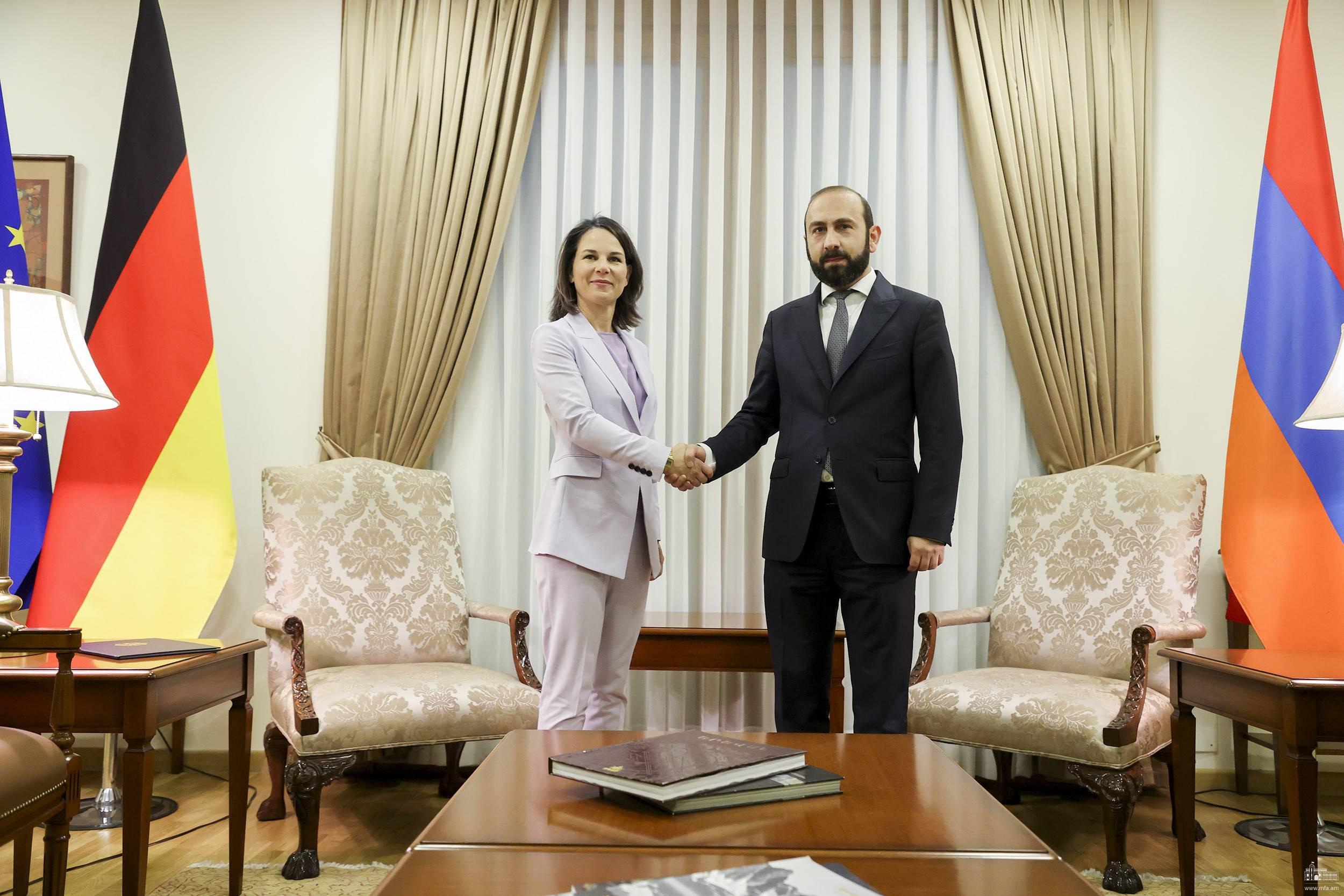
German-Armenian Relations: “Too little and too late”
The German Foreign Minister traveled to the southern Caucasus to promote peace. But how invested is Germany in contributing to stability in the region?
By Luise Glum, Hetq Intern
Last week German Foreign Minister Annalena Baerbock traveled to Armenia and Azerbaijan to discuss perspectives of peace in the region. She met her Armenian counterpart Ararat Mirzoyan in Yerevan and visited the border region to Nakhchivan where members of the civil European observation mission EUMA are stationed. In Baku she had a talk with Azerbaijani Foreign Minister Jeyhun Bayramov. Prior to her visit, Bearbock announced she wants to advocate mutual trust “at a time when the traumas of the past and the present are so keenly felt.”
Baerbock came to office in 2021 and it was her first visit to Armenia as minister. However, she had been to the region before, travelling to Georgia earlier this year. According to media reports, the trip to Armenia and Azerbaijan was supposed to take place two weeks earlier but was postponed due to the situation in in the middle east.
Diplomatic relations between Germany and Armenia were established in 1992, a few months after Armenia's independence from the Soviet Union. According to the German Foreign Office, Germany is Armenia's principal trading partner in the EU, exporting motor vehicles, machinery and chemicals and importing metals and textiles. Furthermore, Germany is one of the main foreign direct investors to Armenia and one of the most active donor countries. Since 1992, the country has supported Armenia with over 750 million Euros in the form of loans and grants. The current social-democratic government agreed last year to transform German-Armenian development cooperation into a bilateral partnership. In Yerevan, Baerbock announced that she wants Germany to provide a further 9.3 million Euro of humanitarian aid.
However, these commitments on a bilateral level are not necessarily mirrored in the country's will to play a substantial role in solving security issues in the region. Stefan Meister is a political scientist working for the research institute “German Council on Foreign Relations “. He calls the German engagement “too little and too late.” The foreign minister could have become more involved in this conflict before the exodus took place in Karabakh, Meister states, but there hasn't been any prior visit.
Specifically, Meister criticizes a lack of German initiative concerning the trilateral talks hosted by Charles Michel, president of the European Council. In a series of meetings since May this year, Armenia's and Azerbaijan's leaders and high-ranking representatives came together to discuss the normalization of their countries' relations. A meeting issued for October together with the German and French presidents was cancelled after Aliyev withdrew his participation.
During her trip, Baerbock called the talks a “bridge that can show the fastest way to peace” and added that “that is why it is so important that a new round of negotiations can take place as soon as possible.” While Meister welcomes those statements, he notes that “when Charles Michel tried to negotiate between the conflicting parties, there was hardly any German support.” Apart from the presence of the German chancellor at a meeting in Moldova in June, he hardly played a role in mediating this conflict, the political scientist states. “There is rhetorical support and meetings with German politicians, but I don't see that the government supports the negotiations at a high level or built up pressure.“ To show that Germany and the EU have a real interest in a solution, says Meister, it would take large member states to talk to Aliyev and Pashinyan on the highest political level.
An initiative the EU did bring forward is the civil observer mission EUMA, it launched at the end of February 2023 with the aim to observe and report on the security situation on the Armenian-Azerbaijani border. During her visit, Baerbock spoke out in favor of an increase of its personnel. The civil observers come from different EU-member states, the head of the mission is a senior officer of the German Federal Police.
According to Meister, the mission is a crucial step by the EU to bring in more transparency on the ground and has a “certain deterrent quality“ with regard to Azerbaijan. But since it is a civil mission, it can't intervene in case of military escalation. “It would not stop Azerbaijan from doing certain military things if they are able to do so.” In this respect, a more robust mission is needed, he says, and a different mandate. “But the EU member states won't agree on that, and the regional players won't necessarily want that either.”
Meister believes such a military escalation is realistic.
“It depends on the extent to which Pashinyan agrees to everything Azerbaijan demands from him regarding the corridor, i.e., access, border controls, possibly also stationing of Russian border troops. And if he doesn't agree with the conditions, then I assume they'll just take it militarily.” Meister says that in such a case, Armenia couldn't count on military support from the west: “The EU and US will never intervene militarily in this region in any form. So, there are no security guarantees for Armenia.”
Photo credit: MFA of Armenia
 Videos
Videos Photos
Photos
Write a comment